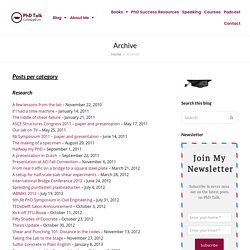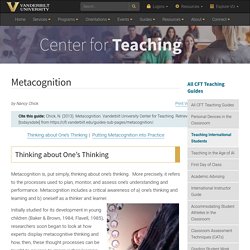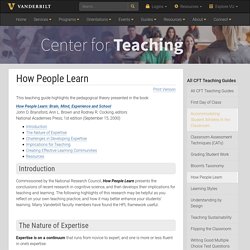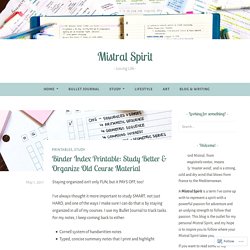

Archive – Eva Lantsoght. Research Presentations Tomorrow’s presentation – December 1, 2010Evaluation of my presentation – December 3, 2010Preparing a presentation without slides – May 21, 2011Preparing a presentation without slides – the aftermath – May 24, 2011Another presentation style – February 4, 2012Slideshare – April 12, 2012Giving a poster presentation for the first time – June 26, 2012Powerposing to boost your conference presence – October 17, 2012Performing for TEDx Delft Salon – October 19, 2012 Podcast interview – July 9, 2020El futuro del homrigon: desde la mezcla hacia la estructura – October 6, 2020Presentation for ANEIC (second of 2020) – November 3, 2020Presentation on testing prestressed girders – November 10, 2020IABSE online lecture – December 10, 2020CONEIC 2020 presentation – January 5, 2021 The process of doing a PhD Academia.

Learning Technologist Resources. Metacognition. Print Version by Nancy Chick, CFT Assistant Director Thinking about One’s Thinking | Putting Metacognition into Practice Thinking about One’s Thinking.

PCET. Inquiry Based research - How to form your inquiry. How People Learn. Print Version This teaching guide highlights the pedagogical theory presented in the book: How People Learn: Brain, Mind, Experience and School John D.

Bransford, Ann L. Brown and Rodney R. Cocking, editors National Academies Press; 1st edition (September 15, 2000) Introduction Commissioned by the National Research Council, How People Learn presents the conclusions of recent research in cognitive science, and then develops their implications for teaching and learning.
The Nature of Expertise Expertise is on a continuum that runs from novice to expert, and one is more or less fluent in one’s expertise. Expertise is field-dependent. Characteristics of expertise: Expert learners have well-organized knowledge, not just problem-solving strategies.Expert knowledge is organized to support understanding, not just recall. Challenges in Developing Expertise Being aware of these challenges can help the expert in a field to work more productively with novices in the field to develop their expertise: 1. 2.
How to Take GREAT Notes // FAST, ADAPTABLE, ORGANIZED: The Mistral Method (2/3) Binder Index Printable: Study Better & Organize Old Course Material – Mistral Spirit. Staying organized isn’t only FUN, but it PAYS OFF, too!

I’ve always thought it more important to study SMART, not just HARD, and one of the ways I make sure I can do that is by staying organized in all of my courses. I use my Bullet Journal to track tasks. For my notes, I keep coming back to either: Cornell system of handwritten notesTyped, concise summary notes that I print and highlight (Speaking of which: I’m looking forward to sharing with you how I take both of these kinds of notes! As for the notes and all the course material itself, I’ve got a simple method to keep everything organized in their binders! Yep, each one of my courses has its own binder. So, what’s the secret? (Want to print your own? I’ve never been an Index girl, myself. Mathematics For a subject such as math, I only index every once in a while. Taking a little bit of time every couple of months is SO worth it. A Math-Related Side-Note Accounting I never kept an index throughout my accounting class. P.S.
English Economics. To Become a High-Performer, Say “No” Research shows that doing more doesn’t always lead to higher performance.

In this post, we explain why. By The Arbinger Institute | August 10, 2018 Most employers highly prize employees they can reliably depend upon to accomplish the tasks assigned to them. In turn, most employees want to be dependable and helpful. Yet these good intentions often lead to situations where management asks a productive employee during an already hectic week to complete an additional project.
But research shows that doing more doesn’t always lead to higher performance. So why do we say “yes”? Saying “Yes” for the Wrong Reasons On the surface, saying “yes” to additional tasks and projects is a way to be helpful to our organization. However, self-focused reasons might be motivating us to say “yes”…causing us to take on additional tasks for the wrong reasons. We might see additional work as an opportunity to project a certain image of ourselves.
Occam’s Razor: Saying “No” for the Right Reasons Professor Morten T.